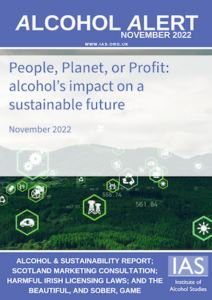In this month’s alert
People, planet, or profit: Alcohol’s impact on a sustainable future Podcast feature
We’re pleased to announce the launch of our new report: People, planet, or profit: Alcohol’s impact on a sustainable future. On our podcast this month we discussed the most interesting findings.
The report brings together the learnings from our sustainability webinar series and provides insight into:
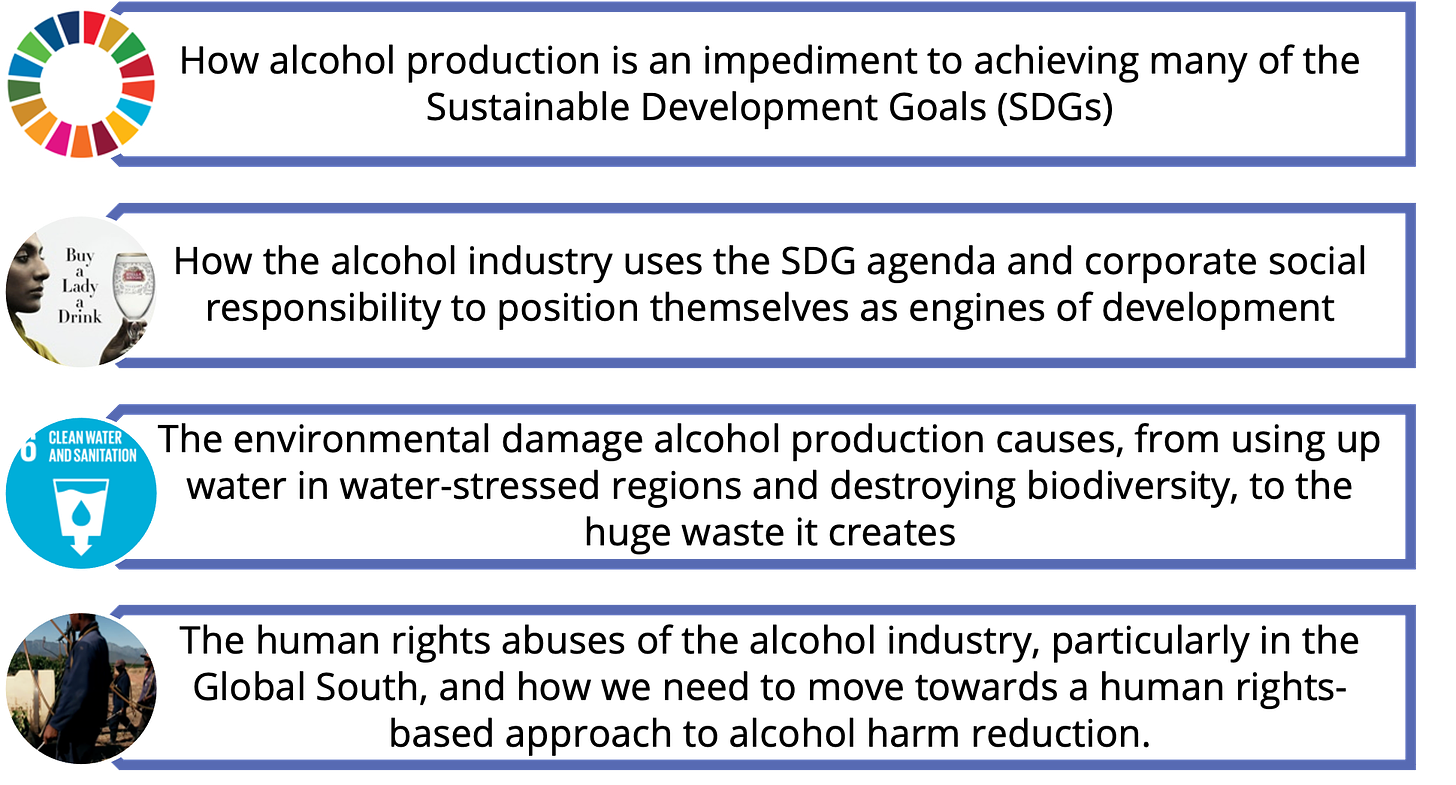
Discussing the report, IAS’ Head of Policy Jennifer Keen said:
“As a society we know that we need to reduce our consumption across products generally, due to the burden on natural resources and biodiversity.
“However alcohol has a dual harm, as not only does it negatively impact the environment, but also kills millions of people around the world every year.
“So reducing alcohol consumption, through known, evidence-based population measures – such as reducing alcohol’s affordability through an increase in duty – will improve both the health of people and also the planet.”
Scotland launches consultation to restrict alcohol advertising and promotion
The Scottish Government has opened a consultation on restricting alcohol advertising and promotion, in an effort to reduce harm, particularly among children and people in recovery. It closes on 9 March 2023
The release states that other European countries have already made restrictions, and this consultation sets out a potential Scottish approach:
“This consultation sets out a range of potential proposals to do this including prohibiting alcohol advertising in outdoor public spaces, phasing out alcohol sponsorship and reducing the promotion of alcohol in-store.”
Public Health Minister, Maree Todd MSP said:
“There is clear evidence that adverts which glamorise drinking can encourage young people to drink alcohol and have a detrimental impact on those in recovery from problem alcohol use.”
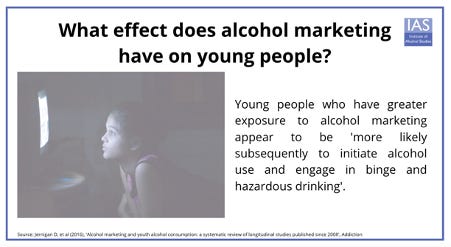
Alison Douglas, chief executive of Alcohol Focus Scotland, said:
“We are pleased to see that the Scottish Government have today published their consultation on introducing restrictions on alcohol marketing which covers a broad range of marketing tactics including sponsorship of sports and events, outdoor advertising, branded merchandise and how alcohol is sold in shops. Scotland has the powers to act in all of these areas. This is an opportunity for us to be ambitious and to put people’s right to health before company profits by introducing restrictions.”
Following the announcement, Matt Lambert, chief executive of the alcohol industry body the Portman Group said:
“These recommendations are entirely disproportionate and inhibit consumers’ ability to make informed choices, and restrict the ability to trade for producers and retailers who ensure that alcohol is sold responsibly.
“The Scottish government’s own Health Survey published last week shows that average weekly intake has fallen to well below the official UK government weekly guidelines. This has all occurred at a time when the amount of advertising spend has increased, suggesting that there isn’t an immediate correlation between them.”
The Scottish Football Association (SFA) and Scottish Professional Football League (SPFL) also responded, arguing that:
“It is clear that the sporting, social and financial implications could be extremely grave. To remove that revenue stream, at a time when we are experiencing the most significant economic challenges for a generation, could have huge implications for clubs and Scottish sport more generally.”
Matt Lambert also told Al Jazeera: “About a tenth of UK sports sponsorship comes from alcohol – and that supports a healthy, balanced lifestyle by helping grassroots sport and cultural events.”
Minimum Unit Pricing reduces alcohol consumption
Minimum Unit Pricing (MUP) “is achieving one of its key aims”, according to Scottish Government Ministers, after a new report concluded that it has been effective in cutting alcohol consumption.
Looking at the first three years since introduction, new research by Public Health Scotland (PHS) and Glasgow University has concluded that the policy is reducing overall sales. The report states that:
“The overall reduction was driven by reduced per-adult sales of cider, perry, spirits and beer through the off-trade, although this was partially offset by increased off-trade sales of fortified wine and, to a lesser extent, wine.”
Report author Lucie Giles said: “We can conclude that, across Scotland as a whole, MUP has been effective in reducing alcohol consumption in the first three years of implementation.”
Total volume of pure alcohol sold (on- and off-trade combined) in Scotland and England & Wales, weekly, January 2013 to May 2021, (a) weekly trend, and decomposed
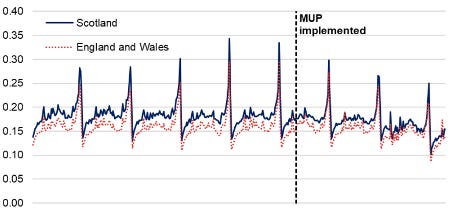
Public Health Minister Maree Todd said:
“I welcome this report which shows that minimum unit pricing has been effective in creating a 3% net reduction in total alcohol sales in the first three years of implementation. This important conclusion takes account of other factors such as the impact of the pandemic on alcohol sales, seasonal variations, existing trends, household income and comparison with England and Wales where MUP was not in place.”
Jim Lewsey, professor of medical statistics at the University of Glasgow and co-author of the paper, highlighted one of the strengths of the study:
“Incorporating data from England and Wales into our analysis controls for any changes in sales in a neighbouring region where the legislation was not introduced. This was of particular importance with the covid-19 pandemic occurring in our three year post-intervention study period, as we know the pandemic impacted on where people were able to purchase alcohol.”
“Regressive and harmful” extension of alcohol licensing in Ireland
Ireland’s plans to extend licensing laws has been met with criticism across the public health world.
The plans would allow pubs to serve alcohol later throughout the week and nightclubs to stay open longer.
The Irish Medical Organisation (IMO) said the proposals are a “regressive and harmful” move that runs contrary to the Government’s stated goal of reducing alcohol intake by 20%.
Dr Anne Dee, chair of the Public Health Committee of the IMO, said:
“It makes no sense that, on one hand, it is looking to extend alcohol licensing laws while on the other, it is also looking to reduce alcohol consumption by 20%. This move is, at best, not thought through and, at worst, regressive and ultimately harmful.”
Alcohol Action Ireland said that while they support the modernisation and streamlining of the alcohol licensing process, it is important to note that any extension of licensing hours will have public health consequences.
According to an article in the Irish Independent, Ireland’s Department of Health warned the Health Minister Stephen Donnelly that the proposed licensing changes would increase alcohol harm and put pressure on health services. However, Donnelly apparently chose to not share the memo with his Cabinet colleagues when debating the topic.
The memo stated:
“The Department of Health is of the view the proposals in the Sale of Alcohol Bill, particularly those relating to extending opening hours and providing for the sale of alcohol as an amenity, will increase alcohol consumption, increase alcohol health harms and increase the pressure on our health services from illness and disease.”
Fergus Finlay, former chief executive of Barnardo’s in Ireland said the move amounts to nothing but cheap populism:
“We need more liberal licensing laws like we need a hole in the head.”
In other Irish news, according to the Irish Independent, a new report by the Health Service Executive (HSE) estimates that around 6,000 babies a year are born in Ireland with foetal alcohol spectrum disorder and 600 with foetal alcohol syndrome.
Around 58,000 babies were born in Ireland last year, meaning around one in ten are born with a form of FASD.
New Zealand adopts Green Party’s alcohol harm minimisation bill
The New Zealand Government has removed the special appeals process from Local Alcohol Policies, effectively adopting the first part of Chlöe Swarbrick’s Alcohol Harm Minimisation Bill.
Swarbrick’s Private Member’s Bill has two main aims:
- To remove the appeals process on Local Alcohol Policies, which supermarkets were using to delay or prevent local authorities from introducing alcohol harm-reduction policies
- To end alcohol sponsorship in sports

Swarbrick said:
“Reducing corporate power so genuine community decisions can be made has been one of the consistent recommendations from reviews and independent experts.
“The responsibility doesn’t stop there, because the harm doesn’t stop there. The Government has proven they’ll change the law when the pressure is on. They must also adopt our measures to minimise excessive corporate marketing influence saturating our kids’ lives, particularly through sports.”
Prime Minister Jacinda Ardern spoke to RNZ radio about the change and the potential for ending alcohol sponsorship in sports.
MPs, Lords and over 50 organisations call for independent review on alcohol harm
The Alcohol Health Alliance (AHA) and over 40 MPs and Lords sent a letter to the Prime Minister on 03 November, calling for an Independent Review on Alcohol Harm, similar to the recent Independent Review of Illicit Drugs led by Dame Carol Black.
The letter highlighted the rise in alcohol harm during the pandemic and how alcohol harm is unequally distributed among the UK population.
“Alcohol is the leading risk factor for death, ill-health, and disability amongst 15-49-year-olds. It causes more working years of life lost than the ten most common cancers combined.
“The COVID-19 pandemic has further exacerbated the situation to crisis point, with deaths from alcohol rising to an all-time high. In total, alcohol costs our society at least £27 billion every year, of which less than half is offset by tax revenue on alcohol. This includes direct costs such as the £11.4 billion incurred by alcohol-related crime, as well as indirect costs such as contributing to overweight and obesity.”
The BMJ featured the letter and quoted signatory Dan Carden MP, who said:
“After a decade of government inaction, alcohol harm has reached crisis point—doing its worst damage in our most deprived communities—and requires immediate government intervention.”
Alcohol industry bodies continue to fight the proposed rise in alcohol duty
Various alcohol industry trade bodies continue to argue that rising alcohol duty in line with inflation is unfair.
In an open letter a group of trade bodies stated that a rise of alcohol duty with inflation will fuel inflation and risk thousands of jobs, and that previously freezing duty essentially led to an increase in tax revenue.
Alcohol duty is supposed to rise every year with inflation, however it has been either cut or frozen every year over the last decade, apart from in 2017-18.
Real duty rates indexed
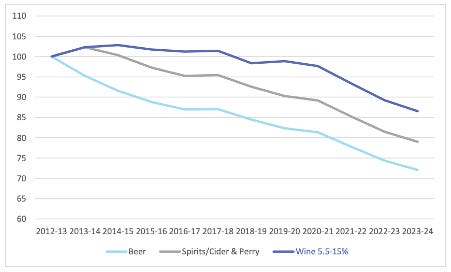
The Scotch Whisky Association (SWA) argued that this would mean alcohol duty was at its highest level since 1643. As health economist Colin Angus explains in this AHA blog, that is true in cash terms, but totally ignores inflation. In real terms, alcohol is far more affordable now than it was a few decades ago.
Baroness Hayter of Kentish Town also hit back in the Independent, writing:
“One of the more bizarre claims by the SWA is that freezing alcohol duty brings in more revenue to the Treasury. This is based on discredited Laffer Curve arguments and cherry-picking of government data. Add to that the SWA’s director of communications claiming that this will be the largest duty increase in 375 years, while conveniently ignoring inflation.
“It is shocking that even within this economic climate the alcohol industry is behaving in such a petulant way when this inflationary increase is supposed to happen every year.”
On 16 November, The Telegraph posted a poll which showed its readers supported proposals to increase alcohol duties, with 43 voting to increase duties compared to 27 voting not to. The article states:
“The increase, along with an increase on the rates of duty on tobacco, is a move which readers support as many say it would discourage alcohol abuse and cigarette smoking, which places a large burden on the NHS.”
The beautiful, and sober, game
Two days before the Football World Cup opening game in Qatar, it was announced that alcohol would not be sold in the competition’s eight stadiums.
The sale of alcohol is strictly controlled in the Muslim country and the plan had been to only sell alcohol “in select areas within stadiums”.
A BBC article stated that the last-minute ban was “emblematic of the contradictions at the heart of this World Cup. It’s also symbolic of the fine line Qatar is walking: presenting itself on one of the world’s biggest of stages as an outward-facing, welcoming country while maintaining its cultural, religious and conservative integrity.”
Some in the football community discussed the ban, with English defender Eric Dier stating that he’d “like to think you can enjoy yourself with or without alcohol”. FIFA president Gianni Infantino said: “I think if, for three or four hours a day, you cannot drink a beer, you will survive”.
Budweiser, which sponsors the World Cup, tweeted that it will donate the beer it cannot sell in stadiums to the winning country. A Guardian article says this announcement led to Twitter users mocking the quality of the beer, stating it acts as a disincentive to win the tournament.

Before the World Cup started, and before the alcohol ban was announced, the British beer producer BrewDog launched an ‘anti-sponsorship’ campaign that criticised the tournament being held in Qatar.
The campaign presented adverts with spray paint over footballing statements, such as the example below.
BrewDog said in a statement on its website:
“This isn’t a World Cup. It’s a World F*Cup. Football’s been dragged through the mud before a single ball’s been kicked. Let’s be honest: Qatar won it through bribery. On an industrial scale.”
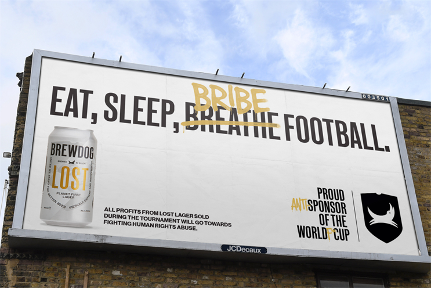
Unite Hospitality, the union for workers in bars and restaurants, described BrewDog’s latest effort as:
“Yet another disingenuous advertising campaign designed to distract customers from the fact BrewDog is one of the worst employers in the brewing industry when it comes to doing the right thing by its workers.
“The treatment of workers in Qatar is an international scandal, but #BrewDog have a cheek saying anything about workers’ rights when hundreds of their own workers – past and present – signed an open letter detailing a ‘culture of fear’, with workers demanding an apology for harassing, assaulting, belittling, insulting or gaslighting them.”
Government says it won’t introduce minimum training standards for councillors about licensing
In July the House of Lords Liaison Committee published a report on the UK’s licensing system and called for ministers in England to undertake a formal review of the impact of minimum unit pricing in Scotland and Wales.
The House of Lords report also found several flaws in the current licensing system in England and told the Government to introduce minimum training standards for councillors involved in licensing decisions.
The Government responded in early November, stating that they won’t be introducing a formal minimum standard for training for councillors.
Regarding MUP, they said “we maintain an interest in the impact of minimum unit pricing in Scotland and look forward to seeing the findings from the evaluation. We will consider those findings in detail once available”.
The chief executive of the Night Time Industries Association said the response is “extremely disappointing”. Michael Kill said:
“In all honesty, we are not completely in agreement with all the recommendations held within the HoL’s review, but [the Government response] was in the main around acknowledgement and ongoing concern, a rhetoric which has no value to the evolution of licensing and planning within our sector.”
Head of UKHospitality, Kate Nicholls, said:
“It’s disappointing [the Government] will not carry out a formal consultation on the impact of the late-night levy, particularly with areas removing or reviewing the levy voluntarily. Any review would no doubt show the enormous impact of the levy on business and UKHospitality continues to call for the levy to be abolished.”
A recent study, summarised in an IAS blog, shows that the levy had little negative impact on businesses.
Alcohol-related call-outs placing a burden on nine in ten North East ambulance staff
A new survey by Balance North East highlights the extraordinary burden alcohol-related call-outs place on ambulance service staff in the North East.
Nine in ten staff said these call-outs place an avoidable demand on the service and more than three-quarters have been physically or verbally assaulted.
The survey of North East Ambulance Service employees found:
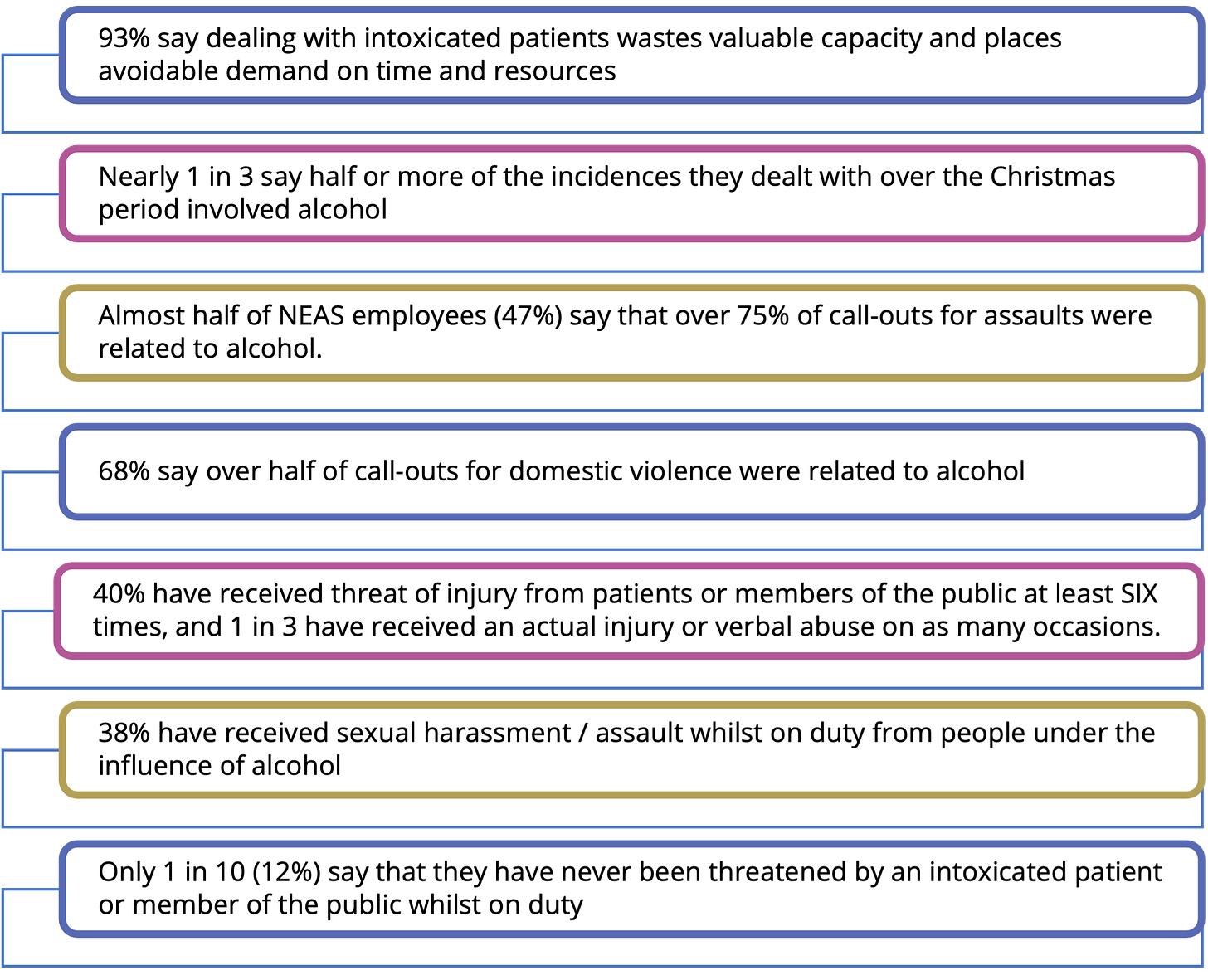
Sue Taylor, Head of Alcohol Policy at Balance NE, said:
“While many will blame individuals who drink too much for this, we need to remember that alcohol can be an addiction, which some people are struggling with. Heavier drinking since the pandemic is spilling over into more incidents impacting on our emergency services.
“It is wrong that people can buy a week’s worth of cheap strong alcohol for less than £5. And during the pandemic alcohol companies and supermarkets bombarded us with advertising, encouraging us to drink. Alcohol is still too cheap, too available and too heavily promoted and we need action at national level to protect health, our NHS and our emergency services.”
Alcohol Toolkit Study: update
The monthly data collected is from English households and began in March 2014. Each month involves a new representative sample of approximately 1,700 adults aged 16 and over.
See more data on the project website here.
Prevalence of increasing and higher risk drinking (AUDIT-C)
Increasing and higher risk drinking defined as those scoring >4 AUDIT-C. A-C1: Professional to clerical occupation C2-E: Manual occupation

Currently trying to restrict consumption
A-C1: Professional to clerical occupation C2-E: Manual occupation; Question: Are you currently trying to restrict your alcohol consumption e.g. by drinking less, choosing lower strength alcohol or using smaller glasses? Are you currently trying to restrict your alcohol consumption e.g. by drinking less, choosing lower strength alcohol or using smaller glasses?
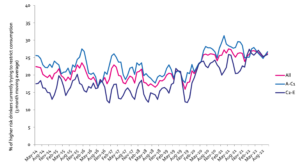
Serious past-year attempts to cut down or stop
Question 1: How many attempts to restrict your alcohol consumption have you made in the last 12 months (e.g. by drinking less, choosing lower strength alcohol or using smaller glasses)? Please include all attempts you have made in the last 12 months, whether or not they were successful, AND any attempt that you are currently making. Q2: During your most recent attempt to restrict your alcohol consumption, was it a serious attempt to cut down on your drinking permanently? A-C1: Professional to clerical occupation C2-E: Manual occupation
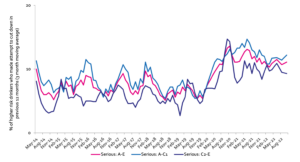
Podcast
Our monthly podcast features interviews with experts from across the sector.
Bottling Up Trouble: alcohol, workplaces, and the need for change
Tabbin Almond –
Alcohol-freedom coach and author

